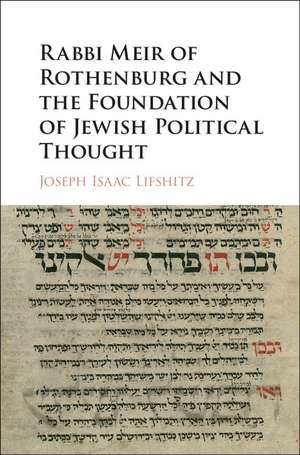Rabbi Meir of Rothenburg and the Foundation of Jewish Political Thought
Autor Joseph Isaac Lifshitzen Limba Engleză Hardback – 28 oct 2015
Preț: 499.54 lei
Preț vechi: 583.54 lei
-14% Nou
Puncte Express: 749
Preț estimativ în valută:
95.59€ • 99.60$ • 79.15£
95.59€ • 99.60$ • 79.15£
Carte indisponibilă temporar
Doresc să fiu notificat când acest titlu va fi disponibil:
Se trimite...
Preluare comenzi: 021 569.72.76
Specificații
ISBN-13: 9781107008243
ISBN-10: 1107008247
Pagini: 273
Dimensiuni: 158 x 235 x 22 mm
Greutate: 0.53 kg
Editura: Cambridge University Press
Colecția Cambridge University Press
Locul publicării:New York, United States
ISBN-10: 1107008247
Pagini: 273
Dimensiuni: 158 x 235 x 22 mm
Greutate: 0.53 kg
Editura: Cambridge University Press
Colecția Cambridge University Press
Locul publicării:New York, United States
Cuprins
Part I. Introduction: 1. Framing the discussion: overview of the literature; 2. Methodology: identifying the relevant texts; 3. Methodology: Halakha and Agada - laws, principles, and ideology; 4. Overview of the book; Part II. Historical Background: 5. R. Meir of Rothenburg and his teachers and students; 6. The history of the Jewish people and Jewish communities in Germany and Northern France (1000–1300); 7. The development of Talmudic exegesis in Germany and Northern France (1000–1300); 8. Highlights of R. Meir's biography; 9. D. R. Meir's Halakhic approach; 10. Political theory in Germany and Northern France (1000–1300); Part III. Politics as Private Interest: 11. Community as partnership; 12. The role of custom in monetary laws; 13. Beyond partnership: the community as corporation; Part IV. The Sacred Nature of the Political Sphere: 14. The common good; 15. Majority-rule; 16. Agency and representation; 17. The theological definition of community; Part V. Conclusion: 18. Politics as extra-legal activity: ambiguity in R. Meir's works; 19. The theology of unity and despotism.
Recenzii
'This splendid, erudite book will serve many audiences, including historians of Judaism and students of comparative law and of comparative political thought.' Menachem Kellner, Shalem College, Jerusalem
'It is often assumed that medieval Jewish thinkers only formulated political theory in a Platonic or Aristotelian mold. But, in this extraordinary and original study, Isaac Lifshitz clearly and persuasively shows that the thirteenth-century German rabbi, Meir of Rothenburg, formulated a political theory out of classical Jewish sources alone, using rabbinic conceptions alone. Only a scholar of Isaac Lifshitz's vast learning and theoretical perspicacity could have reconstructed Rabbi Meir's political theory in a way that nonspecialists can readily understand. This book is an original contribution to Jewish studies specifically, and to political theory in general.' David Novak, University of Toronto
'This investigation into the political theory of Rabbi Meir Rothenburg is a major contribution to both the theory of halachic dispute and the emergence of a Jewish political discourse in the Middle Ages. Retracing the sources of Rabbi Rothenburg back to Torah, Talmud, the Geonim, and the Sephardic thinkers, this brilliant research demonstrates his unique concept of a Jewish political theology.' Christoph Schmidt, Hebrew University of Jerusalem
'It is often assumed that medieval Jewish thinkers only formulated political theory in a Platonic or Aristotelian mold. But, in this extraordinary and original study, Isaac Lifshitz clearly and persuasively shows that the thirteenth-century German rabbi, Meir of Rothenburg, formulated a political theory out of classical Jewish sources alone, using rabbinic conceptions alone. Only a scholar of Isaac Lifshitz's vast learning and theoretical perspicacity could have reconstructed Rabbi Meir's political theory in a way that nonspecialists can readily understand. This book is an original contribution to Jewish studies specifically, and to political theory in general.' David Novak, University of Toronto
'This investigation into the political theory of Rabbi Meir Rothenburg is a major contribution to both the theory of halachic dispute and the emergence of a Jewish political discourse in the Middle Ages. Retracing the sources of Rabbi Rothenburg back to Torah, Talmud, the Geonim, and the Sephardic thinkers, this brilliant research demonstrates his unique concept of a Jewish political theology.' Christoph Schmidt, Hebrew University of Jerusalem
Notă biografică
Descriere
This book examines the political thought of Rabbi Meir of Rothenburg, the most important thirteenth century German Rabbi.
